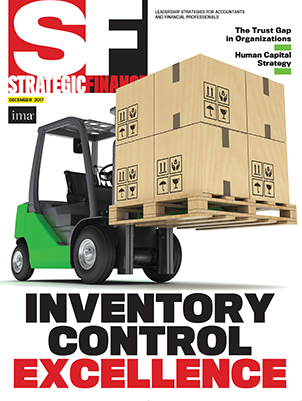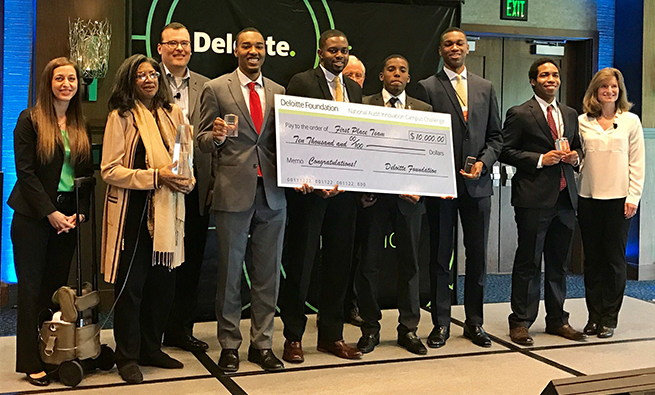Due to these high-tech advances, the evolving audit demands a new kind of auditor who possesses technological proficiencies, enhanced analytical skills, and a deeper understanding of business risk and internal controls that augment the auditor’s deep technical knowledge. Professional services organizations need to engage and develop this new kind of auditor in order to succeed amid the evolving business models and shifts in the supply and demand of audit professionals.
THE CHANGING FACE OF THE PROFESSION
Driven by the proliferation of technology, the audit has likely changed more in the last decade than it has ever before. My position at Deloitte gives me a front-row seat to the transformation taking place in the profession, and I see the added value it brings to clients and the investing public on a day-to-day basis.
According to the Occupational Outlook Handbook, 2014-2024, from the U.S. Bureau of Labor Statistics, the number of accountants and auditors employed in the United States is expected to grow by 11% from 2014 to 2024, faster than the average for all occupations. The entrance of Millennials into the profession has brought about new approaches to hiring and retention practices, leading many companies to create a culture that aligns with the ambition, drive, and motivations of this group. As the first generation of digital natives, Millennials have come of age during a time of great technological change and economic disruption, giving them a strong affinity for technology and a different set of behaviors and desires that are reshaping the workplace, according to the 2017 report “Millennials: Coming of Age” from Goldman Sachs. At Deloitte, approximately three-quarters of audit professionals are Millennials, and this number is likely to grow.
In the same vein, the rise of Generation Z is also catching the interest of professional services organizations. These young adults are just starting to graduate from high school and college—many with business and accounting degrees—and they’re ready to disrupt the workforce even more. According to Deloitte’s sixth annual Millennial Survey, “Apprehensive millennials: seeking stability and opportunities in an uncertain world,” members of Generation Z—having grown up entirely in the digital age—are recognized by their peers as having strong information technology skills and the ability to think creatively. These traits are increasingly in demand for the auditors of today and tomorrow to sustain the profession.
As Millennials and Gen Z-ers continue to shape and increase their presence in today’s workforce, professional services organizations should consider investing in innovative technology while providing nontraditional career paths, flexibility, and work-life balance. These qualities will help attract and retain talent across generations and will continue to highlight auditing as an exciting and fulfilling career with an important public mission.
HARNESSING INNOVATION TO DEVELOP NEXT-GENERATION TALENT
Changes in the professional services industry and what motivates next-generation talent today are having an impact on the availability of accountants and auditors. Firms will likely be well-served if they commit to developing future auditors to meet the pace of innovation in business today and tomorrow. At Deloitte, innovation is a key part of our strategy. We collaborate closely with academia to help accelerate the introduction of new and emerging technologies that current and prospective auditors can use to expand their skill set, enhance quality, and make the audit process more efficient.
For more than 80 years, the Deloitte Foundation has supported educational opportunities aimed to set students and their influencers on a path to success through a variety of programs that promote excellence in teaching, research, curriculum innovation, and experiential learning. The Foundation’s programs enable students to gain the skills and knowledge needed for the ever-changing audit profession and provide colleges and universities with relevant case study content that professors can add to their curricula to expose students to current, real-world issues they will likely face in the business world.
Two Deloitte Foundation events in particular showcase how we’ve engaged with universities to help develop the next generation of auditors. These initiatives also serve as a model that can be used across business and academia in the quest to move the profession forward.
The first event is the National Audit Innovation Campus Challenge. Last year, six regional finalist teams, composed of students from colleges and universities across the country, attended the Challenge Finals at Deloitte University, Deloitte’s learning and leadership development center. The competition gave participating students an opportunity to leverage their skills and experience through practical application. The students explored ways to apply the latest technology and analytics to complex issues facing the accounting and audit profession. I was impressed with the ingenuity and drive demonstrated by the bright, young students competing in the event.
Students from Morehouse College won first place in the competition by designing the requirements and vision for an application to enhance the effectiveness of the risk assessment process. Their idea would use artificial intelligence to identify nonfinancial data from external sources such as social media, journals, periodicals, and newsfeeds. When used in combination with public and nonpublic financial data, the information would contribute to the auditor’s ability to identify risks of misstatement in a company’s financial statements and enhance audit quality. The software would continuously curate data and learn through direct feedback from auditors, allowing them to hone their professional judgment skills in making key audit risk decisions.
In the competition, students were challenged with suggesting ideas as to how Deloitte can better help new hires understand, apply, and adopt the new technologies suggested in their presentations. What emerged was a need to continue to accelerate innovation in education by helping institutions of higher learning keep pace with the rapidly changing marketplace, evolving technologies, and other major trends.
The second event is the Robert M. Trueblood Seminars for Professors, presented in collaboration with the American Accounting Association. The Trueblood Seminars are offered in two sessions annually to gather business educators and Deloitte professionals to share ideas, leading practices, and real-world case studies that professors take back to the classroom to better prepare students for their future careers. Since Trueblood’s inception 52 years ago, more than 2,400 educators have attended the seminars, and more than 2,200 professors use Trueblood cases in their classrooms, impacting thousands of students across the U.S.
Thanks to the increasingly sophisticated technologies and institutional knowledge available to practitioners today, auditing is quickly becoming a tech career that, historically, some students might not have even considered.
THE AUDIT OF THE FUTURE
As we imagine the future of the profession, I am passionate about where the audit is heading. One thing’s for sure: The rapid progression of technology will continue to drive the evolution of the audit and how the profession serves the capital markets. The profession must not only keep pace—it must be out in front leading the way.
Today’s investors seek information that goes well beyond the traditional parameters of basic financial statements in the shifting global business landscape. There’s a growing appreciation among business leaders for bringing an outside-in perspective and delivering meaningful insights for clients to consider. In fact, recent research confirms that business leaders see the value of the audit not only as an obligation, but as a valuable source of business insight that can help guide and inform future decisions.
According to Deloitte’s 2017 Audit Value Survey, nearly 80% of C-suite executives and 91% of audit committee members agree that audits reveal things their companies could be doing differently or better. Furthermore, the survey also showed that over the last three to five years, companies that capitalize on information received from the audit all or most of the time are 47% more likely to achieve growth that their business leaders consider “great” (9 or 10 on a 10-point scale).
These findings send a powerful message that auditors will be viewed increasingly as important contributors to the capital markets for years to come. As a profession, we should take great pride not only in our foundational role in enhancing trust and confidence in the capital markets, but also in providing the platform for future and current professionals to capitalize on innovation to deliver quality audits.

December 2017




